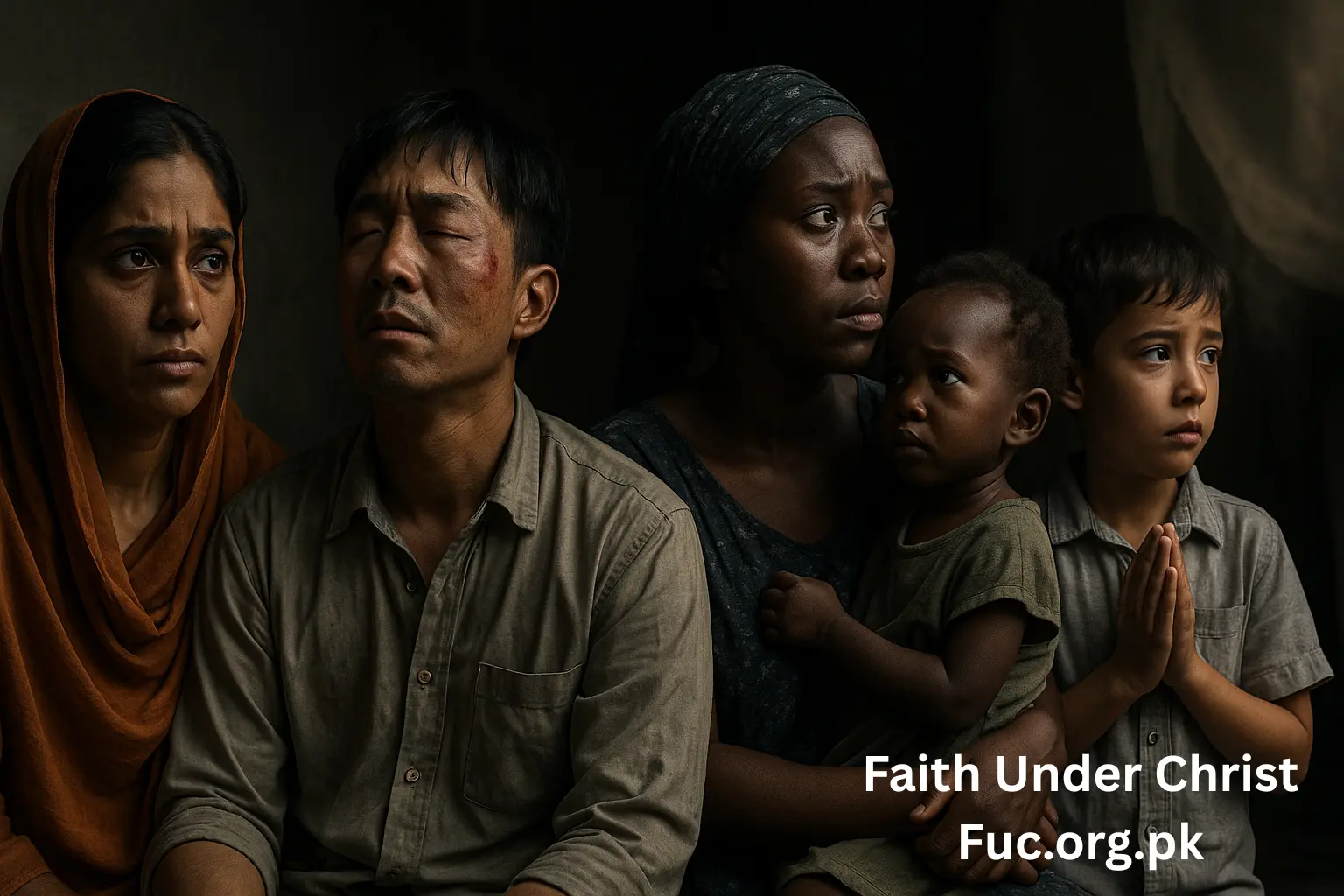According to Open Doors’ 2025 World Watch List, more than 380 million persecuted Christians face persecution or discrimination because of their faith. That includes rejection, violence, imprisonment, and death—all for following Jesus.
Research from the Pew Research Center confirms that Christians face harassment in more countries than any other religious group. Over the last 30 years, the number of nations with high or extreme levels of Christian persecution has nearly doubled.
Open Doors defines Christian persecution as “any hostility experienced as a result of proclaiming the name of Jesus.” This can range from social exclusion and denial of basic services to violent attacks, torture, and execution.
Real Stories of Pain: Persecuted Christians
Persecution is not merely a matter of statistics—it is deeply personal:
A woman in India observes as Hindu nationalists forcibly take her sister away. She is left uncertain if she will ever see her sister again.
In North Korea, a man regains consciousness in a prison camp. The beatings commence once more.
A woman in Nigeria flees from Boko Haram while she is pregnant. Subsequently, her community will reject both her and her child.
In Sri Lanka, children are filled with joy as they make their way to the sanctuary on Easter Sunday. Moments later, a bomb explosion devastates the church.
These tragedies transcend borders and cultures. What binds these individuals together is their Christian identity—and the cost they bear for it.
What Does the Bible Say About Persecution?
Scripture clearly indicates that we are called to support our persecuted brothers and sisters.
In 1 Corinthians 12:25-26, Paul states:
“There should be no division in the body, but… its parts should have equal concern for each other. If one part suffers, every part suffers with it.”
The author of Hebrews reinforces this message in 13:3:
“Remember those in prison as if you were together with them… and those who are mistreated as if you yourselves were suffering.”
Jesus Himself teaches in Matthew 25 that by assisting the “least of these,” we are serving Him. Supporting persecuted believers is not merely an act of charity—it represents Christian unity in practice.
1. Authoritarian Regimes
n nations such as North Korea and Eritrea, the governments strive for complete dominance. Independent religious beliefs are perceived as a challenge to state authority. Christianity, which pledges loyalty to a higher power, is frequently suppressed through means such as censorship, imprisonment, and torture.
2. Extremist Violence
Radical organizations like Boko Haram and ISIS deliberately target Christians. They vandalize churches, kill believers, and perpetrate atrocious acts including kidnapping and sexual violence to instill fear within Christian communities.
3. Legal and Religious Oppression
In regions like Saudi Arabia, Pakistan, or the Maldives, stringent laws prohibit the public expression of Christianity. In Iran, persecuted Christians are permitted to worship only in highly regulated churches, and converting from Islam may result in the death penalty.
4. Disregard for Religious Freedom
The freedom to believe is a fundamental human right. Nevertheless, numerous Christians exist under regimes that curtail this freedom. In Eritrea, for instance, believers are stripped of their rights to assemble, worship, or articulate their faith. Some are confined in metal shipping containers for extended periods without trial.
Human Rights and Religious Freedom
In 1948, the United Nations ratified the Universal Declaration of Human Rights, emphasizing freedom of religion as a fundamental principle. Article 18 of the 1966 International Covenant on Civil and Political Rights (ICCPR) states:
“Everyone shall have the right to freedom of thought, conscience, and religion… [including] the freedom to manifest his religion or belief in worship, observance, practice, and teaching.”
When governments oppress Christians or impose restrictions on their faith, they infringe upon this essential right. Religious freedom transcends being merely a Christian concern—it is a matter of human rights.
What Is Christian Persecution?
Inquire of one hundred persecuted Christians about the meaning of persecution, and you are likely to receive one hundred unique responses. For the believer whose Bible was burned by the Islamic State, the answer is painfully evident. However, persecution is not always so apparent. It can manifest in various forms—some brutal, others subtle yet profoundly damaging.

Take, for instance, Ali, a Christian from Iran, who was arrested when his house church was raided. “When I became a Christian, I told myself, ‘My family, my country, everything is behind me.’ I understood that I was choosing a difficult path without any support. Everyone around me opposed my faith.”
In Colombia, Ines*, a Christian teenage girl, was targeted by armed groups. “The gangs seek girls who lead a Christian life because they know that church girls are respectful and take care of themselves,” she explained. “That is why the commanders are searching for them.”
Hajaratu, a mother in Nigeria, lost her daughter during a violent extremist attack. Through tears, she prays: “Our constant prayer is that this horrific experience never happens in our village again—or to anyone, anywhere.”
Then there is Bae*, a secret Christian in North Korea. She leads a small underground group of believers and once smuggled out a message: “To outsiders, our lives may appear cursed. But our suffering is a blessing from our Father—it is a shortcut to Him.”
Or listen to Islém*, a teenager in North Africa. “My family still thinks I am Muslim. Only my mother knows that I follow Christ. If my father finds out, I fear he might kill me.”
These are not isolated stories—they represent millions. Although their languages, cultures, and backgrounds vary, they share one painful reality: they are persecuted for their faith in Jesus.
What Is Global Christian Relief Doing?
Global Christian Relief (GCR) exists to serve persecuted Christians wherever they are. From Iran to Nigeria, North Korea to Colombia, we go where the need is greatest.
Our Mission:
- Meet urgent needs: From food and shelter to trauma counseling and legal aid.
- Support local churches: Helping leaders strengthen their communities from within.
- Tell their stories: Sharing real testimonies so the world knows what believers endure—and how God sustains them.
- Create access: Providing you a window into the persecuted church so you can pray, give, and act.
Frontline Partner Program Persecuted Christians
Through monthly contributions, our Frontline Partners enable us to respond swiftly to both urgent crises and ongoing needs. With your assistance, persecuted believers discover hope, healing, and strength.
Be Their Voice. Stand With Them.
Christian persecution is a harsh reality. It is violent, painful, and profoundly unjust. However, amidst the suffering, there exists unwavering faith, miraculous resilience, and the undeniable presence of God.
As members of the Body of Christ, we are not meant to turn a blind eye. We are called to support our brothers and sisters—to pray, to give, and to take action.
Learn more. Share their stories. And keep them in your thoughts, just as Christ keeps you in His.

